Disclaimer: We sometimes use affiliate links in our content. For more information, visit our Disclaimer Page.
Military speeches have a profound ability to shift morale and inspire action during critical moments in history. From Winston Churchill’s defiant “We Shall Fight on the Beaches” to General Eisenhower’s rallying words before D-Day, these speeches have altered the course of events. This article will explore notable addresses that not only motivated troops in combat but also influenced the broader narrative of the times, such as Napoleon’s call to arms in Egypt and Patton’s stirring words to the Third Army.
Key Takeaways
- Churchill’s speeches united the British public during World War II, boosting morale amidst uncertainty
- Eisenhower’s D-Day address emphasized collective responsibility and inspired unity among diverse troops
- Napoleon’s rhetorical techniques instilled courage and a sense of purpose in his soldiers during battle
- Patton’s leadership fostered discipline and commitment, enhancing military performance through strong morale
- Henry V’s themes of honor and brotherhood rallied troops against overwhelming odds, inspiring collective strength
The Impact of Winston Churchill’s “We Shall Fight on the Beaches”

In the context of World War II, Winston Churchill’s “We Shall Fight on the Beaches” speech emerged during a dire moment for Britain, highlighting the nation’s struggle against aggression. This address conveyed key messages of resilience and determination, aimed at boosting national morale during crisis. The speech’s long-term effects on the war effort were significant, instilling a sense of unity and purpose among the British people, as they prepared for battle against the enemy.
Britain’s Situation During World War II
In the early years of World War II, Britain faced a precarious situation marked by military setbacks and economic strain. The failure of treaties designed to prevent further aggression left the country exposed, leading to a growing sense of urgency among its citizens. The government’s propaganda efforts aimed to counteract despair, fostering a sense of confidence that victory was possible despite the bleak circumstances.
Churchill’s speeches, including “We Shall Fight on the Beaches,” served as a pivotal part of this morale-boosting program. As the nation braced itself for conflict, the applause that followed Churchill’s address symbolized a collective resolve to fight back. This unyielding spirit played a crucial role in uniting the British public during a time of uncertainty, empowering them to face the daunting challenges ahead:
Key Messages Delivered in the Speech
In his “We Shall Fight on the Beaches” speech, Winston Churchill emphasized the themes of pride and resilience as essential components of British identity during World War II. He articulated a vision where the British people would not only defend their homeland but also stand united against any aggression, inspiring confidence among citizens. The energy in his delivery captured the determination necessary to rally the nation, bolstering their belief in a successful outcome against the odds.
Furthermore, Churchill’s address served as a powerful message of knowledge gained through the trials faced during the war. He acknowledged past sacrifices and honored veterans who fought for the nation’s freedom, reinforcing the importance of their experiences in the fight ahead. This realization helped unify the populace, motivating them to collaborate with allies, including the Soviet Union, to defeat the Axis powers collectively.
Boosting National Morale in Times of Crisis
Winston Churchill’s “We Shall Fight on the Beaches” speech played a crucial role in uplifting national morale during World War II, especially for the middle class who felt the weight of violence and uncertainty. By articulating a defiant stance against tyranny, Churchill connected with citizens who yearned for stability and hope in the face of overwhelming challenges. His words resonated deeply, as they addressed the political climate of the time, fostering a sense of unity that transcended social divides and reinforced the necessity of collective resilience.
Furthermore, this speech emphasized the importance of welfare and support for one another in times of crisis. Churchill highlighted Britain’s commitment to defend not just its territory but also its values, reflecting an understanding of the broader implications for society. By invoking a spirit of cooperation, he inspired individuals to rise to the occasion, thus altering the course of history and reinforcing the belief that their sacrifices would pave the way for a free and prosperous future, reminiscent of the ideals held by leaders like Thomas Jefferson.
Long-Term Effects on the War Effort
The long-term effects of Churchill’s address extended beyond immediate morale. His words laid the groundwork for a strong national identity built on resilience and unity, fostering cooperation among citizens and inspiring them to stand firm against future assaults on their freedoms. As the war progressed, this sense of collective purpose ensured that the sacrifices made by the British people would be recognized and honored, paving the way for a democratic society that upheld the values fought for during the war.
Churchill’s words stirred the spirit of a nation, urging citizens to stand firm in their fight. As the tides of war turned, General Eisenhower prepared to rally the Allied Forces for the monumental task ahead on D-Day.
General Eisenhower’s D-Day Address to the Allied Forces
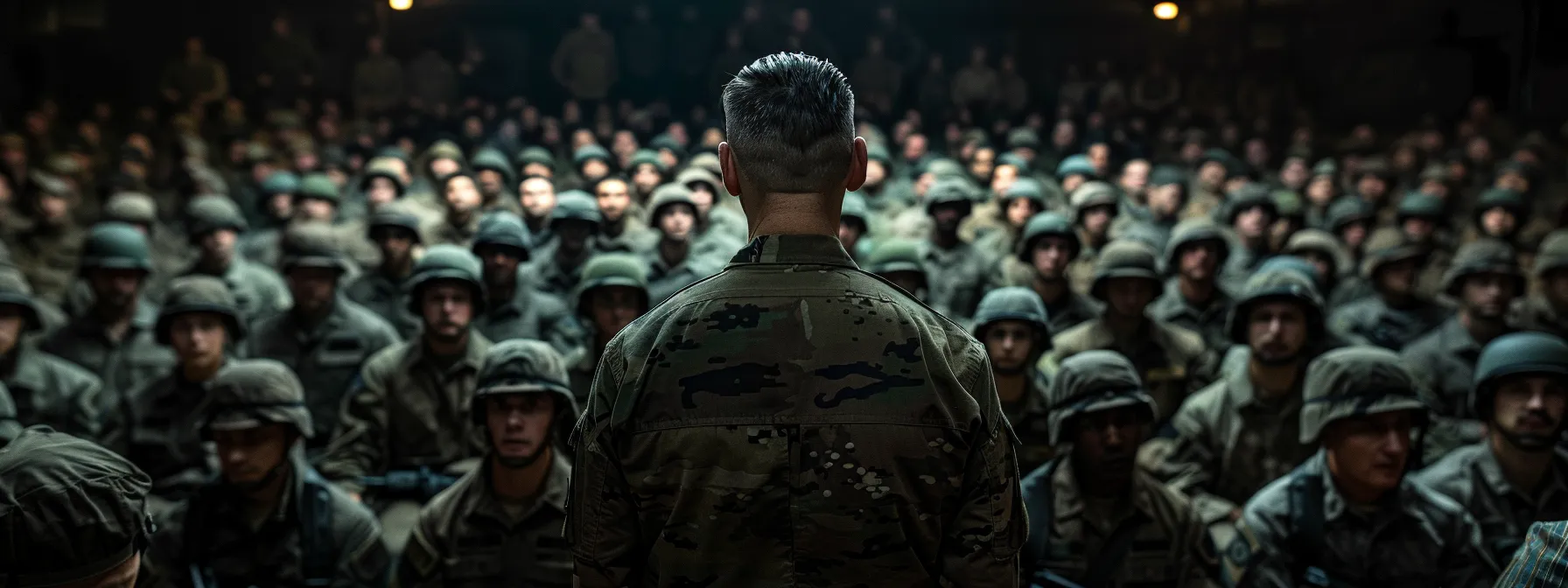
General Eisenhower’s D-Day address to the Allied forces was a pivotal moment in preparing for Operation Overlord. His speech included motivational elements that called for unity among diverse troops, emphasizing a collective responsibility to confront the threat posed by the Axis powers. The address played a significant role in boosting morale, influencing the success of D-Day while reminding soldiers of their commitment to liberty and conscience.
Preparing for Operation Overlord
In preparing for Operation Overlord, General Eisenhower delivered an address that resonated deeply with soldiers from diverse backgrounds. He highlighted their shared commitment to fight against oppression and protect the dignity of individuals, effectively uniting the troops under a common cause. This message fostered a sense of camaraderie and purpose among the soldiers, reminding them that their efforts would impact their lives and the future of millions affected by tyranny.
Eisenhower’s speech served as a crucial document in the historical context of World War II, emphasizing the values at stake during the invasion. By addressing the challenges of immigration, particularly how it could be a source of strength rather than division, he inspired the allied forces to recognize their collective responsibility in confronting oppression. This approach empowered the troops and reinforced their determination to succeed on the beaches of Normandy and beyond, altering the course of history for countless individuals seeking freedom.
Motivational Elements of Eisenhower’s Speech
General Eisenhower’s D-Day address effectively motivated the Allied forces by instilling a sense of shared purpose and commitment. He emphasized the crucial role that each soldier, regardless of their regiment, would play in the fight for freedom against tyranny, echoing ideals that hark back to figures like George Washington. This focus on collective responsibility resonated deeply with the troops, motivating them to overcome their fears and uncertainties as they prepared for one of the most significant military operations in history.
In his speech, Eisenhower also highlighted the importance of the Allied mission, not just in Western Europe, but as a stand against oppression that affected regions like Eastern Europe and even led to discussions about policy choices in places like Syria. By framing the D-Day invasion as a critical step toward liberating nations and restoring dignity to oppressed peoples, he fostered a sense of urgency and resolve among the soldiers. This powerful messaging played a vital role in their morale as they faced the challenges ahead:
Encouraging Unity Among Diverse Troops
In General Eisenhower’s D-Day address, he emphasized the necessity of unity among the diverse troops gathered to confront tyranny. By invoking a sense of faith in their collective mission, he encouraged soldiers from various backgrounds to work together against a common enemy. Eisenhower’s approach fostered camaraderie, assuring “fellow Americans” and other allied forces that their efforts were integral to defeating oppressive ideologies such as socialism and bringing stability to nations, including those affected by the Axis powers.
Eisenhower’s speech served as a unifying force, reminding troops that they were not merely battling for their own nations but for the freedom of millions across Europe. His message resonated deeply with soldiers who faced uncertainty about their roles, allowing them to see their contributions as part of a larger campaign for justice. The overarching goal was clearer: to combat the dictatorship emerging from places like Moscow and restore belief in democratic values that were under threat:
- Eisenhower emphasized unity among diverse troops.
- He called for faith in their collective mission against tyranny.
- His words inspired soldiers to view their fight as a shared responsibility for freedom.
The Address’s Influence on D-Day’s Success
General Eisenhower’s D-Day address significantly influenced the success of the operation by instilling a strong sense of purpose among the Allied troops. His emphasis on the shared commitment to human rights and freedom resonated with soldiers from diverse backgrounds, uniting them against a common enemy. By framing the invasion as a crucial fight against cruelty, he ensured that the soldiers understood the broader implications of their mission, which extended beyond military success to the restoration of dignity for oppressed populations across Europe.
This collective motivation, drawn from Eisenhower’s passionate call to action, enhanced the resolve of the United States Army and its allies as they prepared for the challenges ahead. His words inspired troops to view their efforts as part of a larger campaign for justice, crucial for achieving victory on the beaches of Normandy. The connection formed through his address reinforced the belief that this operation would not only alter the course of history but also align with the principles of the state of the union that sought to uphold freedom and democracy across the globe:
- Eisenhower’s address unified diverse troops for a common mission.
- His message highlighted the fight against cruelty and oppression.
- The address motivated the United States Army to view their role as part of a greater cause.
- The operation aimed to restore dignity and human rights across Europe.
- This collective resolve was pivotal to the success of D-Day.
The Allies stood ready to face their greatest challenge, united in purpose and resolve. Across the sands of Egypt, another leader prepared his troops for a crucial battle, igniting their spirit with words that would echo through time.
Napoleon Bonaparte’s Speech Before the Battle of the Pyramids
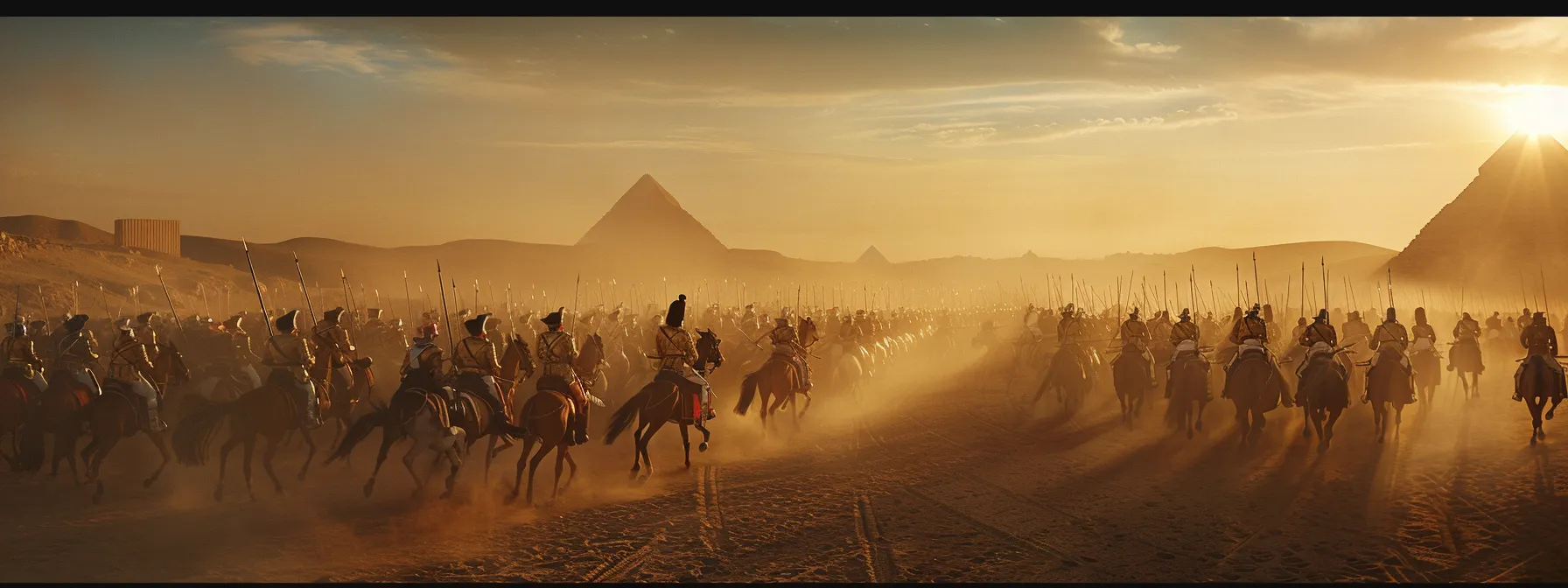
Napoleon Bonaparte’s Speech Before the Battle of the Pyramids
During the Egyptian Campaign, Napoleon Bonaparte delivered a stirring speech that galvanized his troops. He emphasized visionary leadership and the crucial importance of securing victory. By inspiring soldiers with a clear vision and the significance of their mission, Napoleon’s words had a lasting impact on the battle’s outcome, shaping military and diplomatic strategies in subsequent conflicts.
Background of the Egyptian Campaign
The Egyptian Campaign, launched by Napoleon Bonaparte in 1798, aimed to establish French influence in the Middle East and disrupt British trade routes to India. During this time, European powers were intensely competing for control over regions strategically significant for commerce and military advantages. By seizing Egypt, Napoleon sought not only to expand French territory but also to promote the ideas of democracy and revolution against oppressive regimes, appealing to the masses who were disheartened by the existing political debts imposed by foreign rulers.
Inspiring Soldiers With Visionary Leadership
In his address before the Battle of the Pyramids, Napoleon Bonaparte exemplified visionary leadership by clearly articulating a revolutionary purpose for his troops. He emphasized the significance of their mission, framing it not just as a military endeavor but as a quest for peace and liberation from coercion by oppressive rulers. This inspired soldiers to see themselves as part of a greater movement, enabling them to muster the resolve needed to achieve victory against the odds.
Napoleon’s ability to connect with his soldiers on a personal level fostered a sense of unity that was crucial for their success. By portraying the campaign in Egypt as a fight for freedom, he appealed to the soldiers’ desire for justice, contrasting their struggles with those faced by partisans fighting against tyranny. This rhetoric resonated deeply, motivating them to fight with purpose and determination, regardless of the hardships they might face on the battlefield, much like the fervor seen in today’s movements advocating for rights and equality in places such as New York City.
Emphasizing the Importance of Victory
In his speech before the Battle of the Pyramids, Napoleon Bonaparte underscored the critical importance of victory, framing it as not merely a military goal but a matter of truth and justice. He urged his army to understand that their triumph would affirm natural law, demonstrating that oppressed people could rise against their oppressors. This sense of purpose was essential, as it steered the soldiers towards a common objective, reinforcing their commitment during this trial of strength.
Moreover, Bonaparte’s emphasis on victory resonated deeply with his troops, akin to the determination seen in individuals fighting for their rights, such as a police officer upholding justice in their community. By instilling a belief in their mission’s significance, he motivated his army to overcome challenges and strive for success with unwavering resolve. This powerful message not only influenced the outcome of the battle but also shaped historical narratives about the role of military leadership in pursuing liberation and justice.
Impact on the Battle’s Outcome
Napoleon Bonaparte’s speech before the Battle of the Pyramids significantly influenced the battle’s outcome by instilling a sense of purpose among his troops. His compelling message depicted the campaign not merely as a military mission but as a fight for justice and freedom against oppressive rulers. This connection motivated the soldiers to view their efforts as part of a larger struggle, which was essential for overcoming their fears and uncertainties as they prepared for the confrontation.
The rallying effect of Bonaparte’s address was evident as the French forces faced the Egyptian army with renewed vigor and unity. By framing the battle as a fight for natural rights and citizenship, he ensured that his soldiers felt a personal stake in the conflict. This powerful messaging not only inspired determination on the battlefield but also played a crucial role in shaping subsequent military strategies in the region, reinforcing the significance of leadership in moments of crisis:
The sun set over the sands where Napoleon inspired his troops, the weight of history heavy in the air. Soon, another leader would rally his men with fierce conviction, as General Patton faced the challenge of war with unyielding resolve.
General George S. Patton’s Address to the Third Army
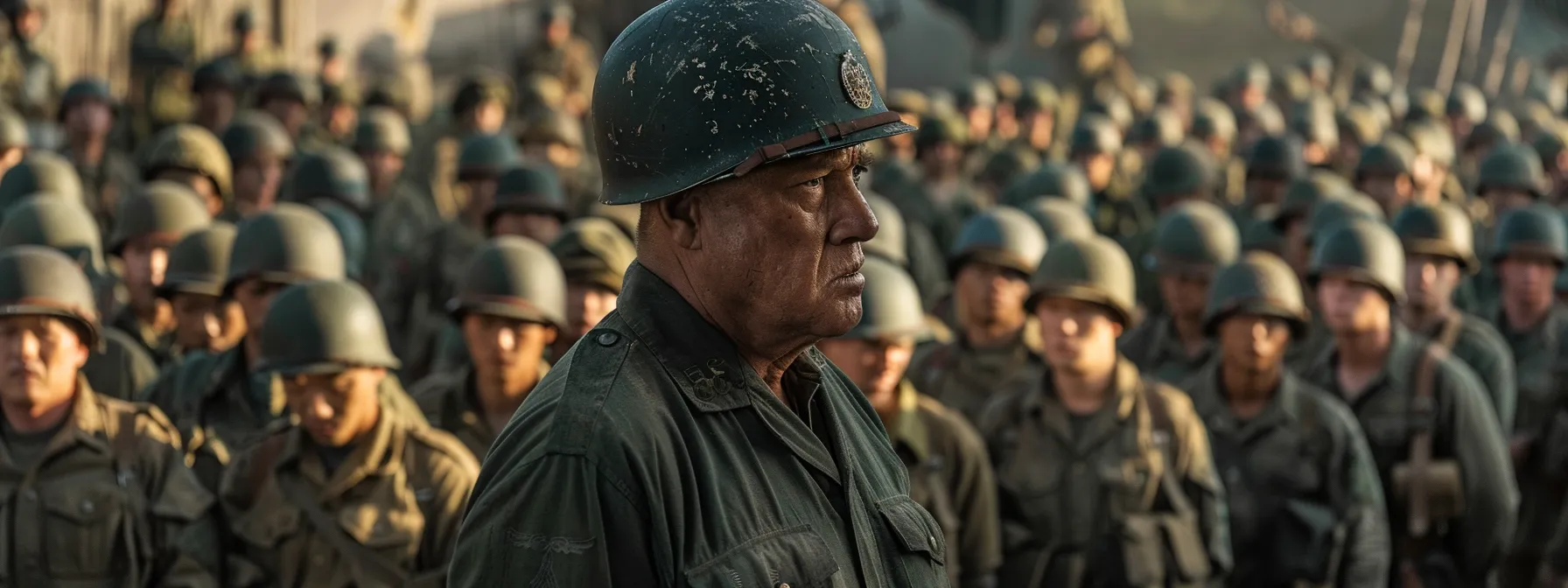
Contextualized within the European Theater of World War II, General George S. Patton’s address to the Third Army exemplifies a unique approach to motivation that strengthened the resolve among troops. His emphatic words inspired soldiers to perform at their best, enhancing military effectiveness. This subsection will explore Patton’s motivational techniques, their impact on troop morale, and the subsequent effects on military performance.
Context Within the European Theater of World War II
During World War II, the European Theater was marked by intense conflict and strategic maneuvering among Allied and Axis forces. At this stage of the war, victory was critical, as the Allies aimed to push back against German aggression. General George S. Patton, a notable commander, understood that motivating troops was essential for maintaining morale during challenging times, particularly as previous years had been shaped by hardship and poverty across Europe.
Patton’s approach to leadership resonated deeply with soldiers who faced uncertainty daily. His speeches often included themes reminiscent of Ronald Reagan’s focus on optimism and resilience during the Cold War, emphasizing the importance of unity and shared purpose. By invoking the value of prayer and strength in faith, Patton inspired his troops, helping them to see their efforts not just as combat, but as a vital contribution toward establishing a brighter future for themselves and the world.
Patton’s Unique Approach to Motivation
General George S. Patton’s approach to motivation set him apart as a leader who understood the historical context of warfare, particularly the principles of law and order that underpin civilization. He emphasized the necessity of discipline and organization, drawing comparisons to the ideals laid out by figures like Alexander Hamilton, which provided his troops with a sense of purpose. Patton’s ability to frame the invasion into occupied territories as not only a military objective but also a fight to uphold these foundational laws galvanized soldiers by instilling a belief that their actions contributed to a greater mission.
Patton’s speeches conveyed a sense of urgency and clarity that connected deeply with soldiers facing the fear and uncertainty of battle. He articulated the importance of unity and common cause, inspiring his troops to view their efforts as crucial in the fight against tyranny. By addressing the moral dimensions of their mission through the lens of international law and the values that define a civilized society, Patton empowered his men to push beyond their limits, believing that their endeavors would safeguard democracy and freedom for future generations.
Strengthening Resolve Among Troops
General George S. Patton effectively strengthened the resolve among his troops by emphasizing their crucial role as defenders of freedom amidst intense conflict. He created a sense of urgency and clarity, motivating soldiers to view their mission beyond mere military objectives. In a time marked by geopolitical tensions, such as the escalating threats from leaders like Joseph Stalin, Patton’s words rallied troops to understand that their actions directly impacted the outcomes of future conflicts and the security of democratic values.
Moreover, Patton recognized the needs and fears of soldiers who faced uncertainties comparable to the pressures experienced during pivotal moments like the Cuban Missile Crisis. By framing their fight as a necessary stand against tyranny, he engaged the troops emotionally and spiritually. This approach ensured that each soldier felt like an essential part of a larger narrative, fostering a commitment to uphold ideals of justice against oppressive forces, thereby empowering their efforts on the battlefield:
- Patton’s messaging invigorated troops’ morale.
- Emphasized the personal stakes of soldiers as protectors of freedom.
- Connected historical struggles with their current mission to fight tyranny.
- Fostered a sense of unity among diverse soldiers to combat common threats.
- Created a commitment that transcended the immediate battle to a larger cause.
Effects on Military Performance
General George S. Patton’s address to the Third Army had a significant impact on military performance, inspiring troops to embrace their roles as defenders of rights and freedoms. His emphasis on leadership forged a strong bond among soldiers, motivating them to push beyond their limits. This united front fostered an environment where soldiers not only fought for victory but also for the principles of Christianity and democracy, greatly enhancing their effectiveness on the battlefield.
The urgency conveyed in Patton’s speech instilled a sense of purpose among the troops, leading to improved discipline and focus during critical operations. His powerful appeal to blood ties and shared sacrifice created a shared commitment to their mission, ultimately resulting in higher morale and increased determination. Soldiers emerged from Patton’s command not just as warriors, but as individuals firmly committed to the greater cause of liberty, shaping the course of history through their collective efforts:
Patton’s words echoed in the hearts of his men, fierce and unwavering. Across the ages, another leader rallied his troops with equal fervor, as Henry V stood ready to lead his army into the fray at Agincourt.
Henry V’s Speech Before the Battle of Agincourt
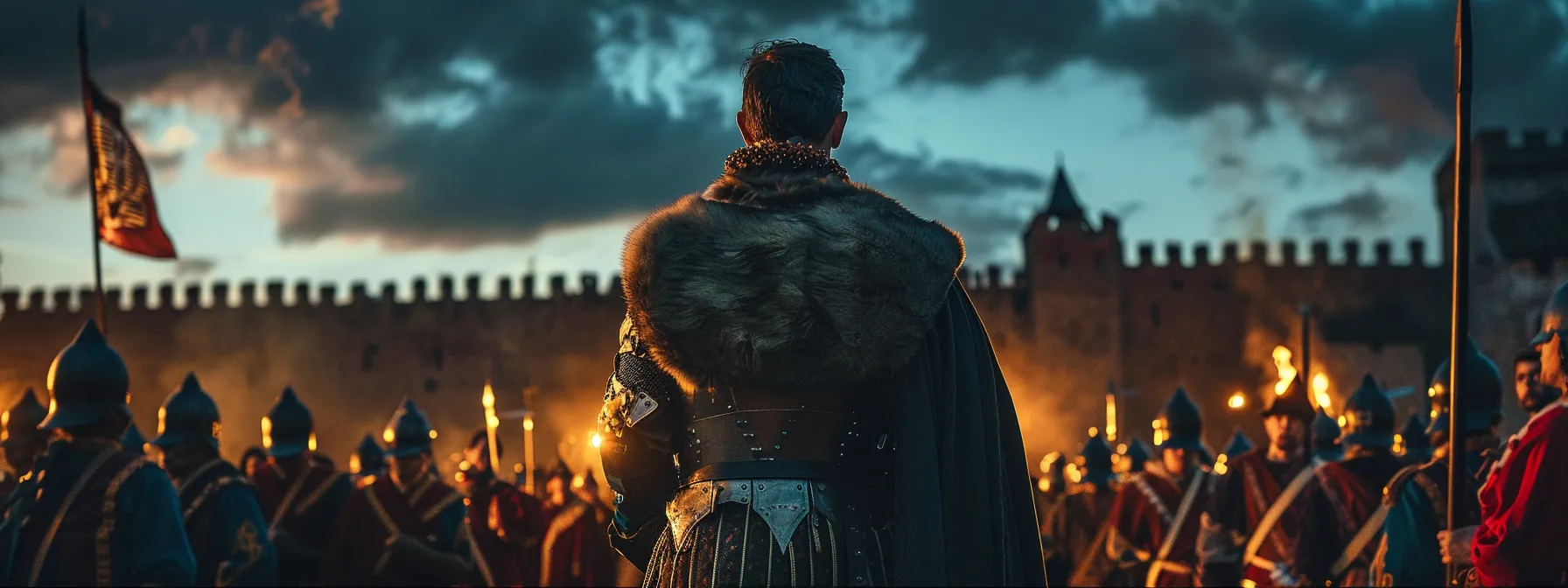
Henry V’s speech before the Battle of Agincourt addressed the numerous challenges facing the English army, including overwhelming odds and dwindling morale. Themes of honor and brotherhood served to rally the troops, emphasizing their shared commitment to defend civil liberties against tyranny. The lasting legacy of this speech continues to be studied for its impactful messaging and motivational power in military history.
Challenges Facing the English Army
The English army faced significant challenges before the Battle of Agincourt in 1415, including overwhelming odds against a larger French force. This situation tested the nation’s unity and resolve, as soldiers grappled with fears for their freedom of speech and personal safety amid the chaos of war. The resonance of Henry V’s speech became crucial in transforming despair into determination, reflecting how his leadership inspired innovation among troops to prevail despite these daunting circumstances.
Logistical issues compounded the difficulties faced by the English army, including inadequate supplies and disease among the ranks. These challenges not only threatened the soldiers’ physical readiness but also raised doubts about their collective sovereignty as a fighting force. Henry V addressed these pain points directly, instilling hope and a sense of duty that helped the English forces look beyond their immediate struggles, fueling a commitment to defend their nation against tyranny and secure a brighter future.
Themes of Honor and Brotherhood
In Henry V’s speech before the Battle of Agincourt, themes of honor and brotherhood played a vital role in uniting the troops as they faced overwhelming odds. He emphasized the importance of fighting not just for their own survival but for the greater good of England, instilling a sense of purpose that resonated deeply. This message fostered solidarity among the men, encouraging them to set aside their fears and focus on their collective mission to defend their freedoms, including crucial elements such as the freedom of the press against tyranny.
The connection forged through the themes of honor and brotherhood was essential in transforming the soldiers’ mindset, empowering them to overcome the dread of battle. By invoking a shared commitment to their cause, Henry V inspired confidence in the troops, solidifying their resolve to confront the enemy. This rallying cry in the face of adversity echoed throughout history, serving as a reminder that collective efforts can thwart oppressive forces, such as nazism, and that unity is critical in preserving societal infrastructure during wartime.
Rallying Troops Against Great Odds
Henry V’s speech before the Battle of Agincourt was pivotal in rallying troops against overwhelming odds, reminding soldiers of their duty to society and the importance of fighting for their collective prosperity. Despite facing a much larger French force, the call to arms underscored the ideals of sacrifice and courage, essential values that have resonated throughout history. By embodying the spirit of unity, Henry motivated his men to confront their fears and work towards a common goal, which is a lesson applicable even in contemporary contexts, such as in leadership roles akin to a president of the United States uniting citizens during a crisis.
Moreover, the speech served as a powerful example of effective communication in times of adversity, illustrating how strong rhetoric can inspire individuals to perform beyond their perceived capabilities. Just as a committed crew aboard a bomber must rely on one another to achieve a shared mission, soldiers were encouraged to band together for the defense of their homeland. This sense of camaraderie not only strengthened their resolve but also played a crucial role in defining the course of history, proving that morale and unity are foundational to overcoming great challenges.
Lasting Legacy of the Speech
Henry V’s speech before the Battle of Agincourt left a lasting legacy that continues to resonate within military and civilian contexts. The emphasis on duty and collective effort inspired future leaders to harness the power of rhetoric in uniting troops and rallying support for critical missions. This legacy demonstrates how effective communication can strengthen resolve, which is vital regardless of the military or geopolitical landscape, from historical battles in Korea to modern-day conflicts involving missile threats.
The speech’s impact extends beyond the battlefield, influencing the principles that underpin military training and civilian morale. Leaders and commanders draw upon Henry’s example, underscoring the importance of commitment to a cause and the courage to face formidable challenges. This approach has paved the way for a framework that values solidarity among corps members, fostering a shared sense of purpose that remains relevant for those who serve in the military today and for citizens striving to protect their rights in times of turmoil.
As the dust settled after Henry’s rallying cry, the tension of battle hung thick in the air. Across the fields, another leader prepared to inspire his men, knowing their loyalty would shape the fate of a nation.
Julius Caesar’s Addresses to His Legions
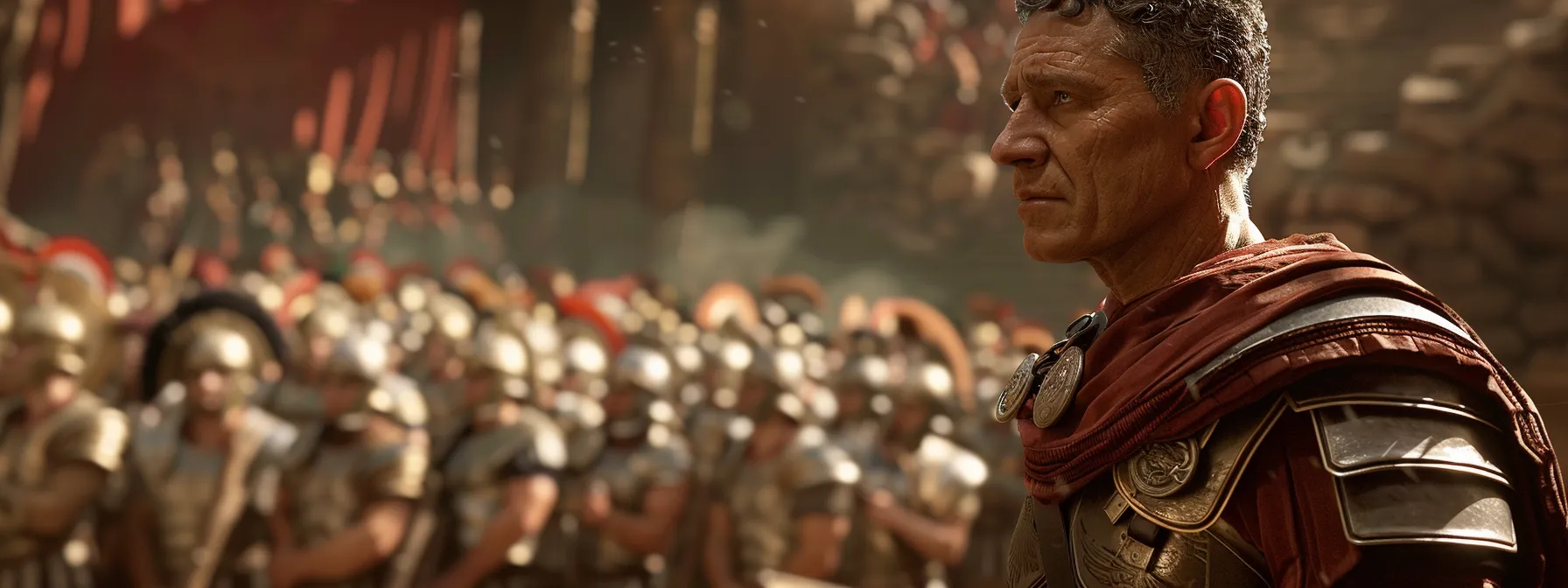
Julius Caesar’s addresses during the Gallic Wars highlight his significance as a military leader. He effectively built soldier morale through techniques that fostered courage and unity among his troops. By instilling loyalty and demonstrating wisdom, Caesar’s leadership not only influenced outcomes in battle but also left a lasting impact akin to tactics studied at institutions like the United States Military Academy. His strategies resonate with lessons from famous leaders, drawing parallels to military dynamics seen in regions such as Southeast Asia.
The Significance of the Gallic Wars
The Gallic Wars, occurring from 58 to 50 BCE, stand as a crucial event in Julius Caesar’s military career, shaping the trajectory of Roman expansion. These campaigns not only showcased Caesar’s military acumen but also solidified Rome’s dominance over Gaul, transforming the political landscape of Europe. The successful conquest allowed for the integration of various tribes into the Roman sphere, enhancing economic and cultural exchanges while increasing Rome’s resources and manpower.
Additionally, the significance of the Gallic Wars extends beyond military victory; they were instrumental in Caesar’s rise to power. Through his addresses to the legions, he effectively cultivated loyalty and morale, ensuring the troops were united and motivated. This unity played a foundational role in his eventual political maneuverings, as his military reputation directly influenced his ascent in Roman politics and shifted the balance of power within the Republic:
Techniques for Building Soldier Morale
Julius Caesar employed several techniques to build soldier morale during the Gallic Wars, primarily focusing on establishing a strong sense of unity among his troops. He frequently shared the hardships faced by the legions, fostering a collective identity that resonated deeply with the soldiers. By acknowledging their sacrifices and emphasizing their shared purpose, Caesar created an environment where troops felt valued and essential to the overall mission, which significantly boosted their resolve and commitment to the campaign.
Additionally, Caesar’s charismatic leadership style involved motivating soldiers through compelling speeches that instilled a sense of pride in their achievements. He often highlighted the glory that awaited them upon victory, portraying the battles not merely as a fight for survival, but as a quest for honor and recognition. This approach not only encouraged soldiers to persevere during the toughest moments but also reinforced their loyalty to Caesar as a leader who genuinely cared for their well-being, playing a crucial role in the success of his military endeavors.
Fostering Loyalty and Unity
Julius Caesar recognized the importance of fostering loyalty and unity among his legions during the Gallic Wars. He often addressed his troops by highlighting their shared experiences and sacrifices, creating a strong bond that transcended individual backgrounds. This connection not only motivated soldiers to fight for a common cause but also reinforced their commitment to Caesar as a leader who valued their efforts.
By utilizing compelling rhetoric that emphasized the glory of victory and the honor associated with their battles, Caesar effectively cultivated a culture of loyalty within his ranks. His speeches inspired soldiers to see themselves as part of a formidable unit, strengthening their resolve to overcome challenges together. This strategic approach to building loyalty and unity played a critical role in the successes of his military campaigns, leading to pivotal outcomes in Roman history:
- Caesar’s personal connection with soldiers built strong allegiance.
- Shared experiences fostered a collective identity among troops.
- Rhetorical techniques highlighted the honor and glory of their mission.
- Unity facilitated successful military strategies against various Gallic tribes.
- Loyalty to Caesar amplified the effectiveness of his command.
Outcomes Influenced by His Leadership
Julius Caesar’s leadership during the Gallic Wars had profound impacts on military outcomes, shaping the Roman Empire’s expansion and solidifying its dominance over Gaul. His ability to connect with the troops through motivational speeches fostered an environment of loyalty, which was instrumental in securing victories against various tribes. This strong allegiance to Caesar not only enhanced the effectiveness of military strategies but also ensured that soldiers remained committed to their missions, significantly altering the course of history for Rome.
Furthermore, Caesar’s emphasis on shared honor and collective purpose cultivated a sense of unity among his legions, facilitating successful campaigns that had lasting effects on Roman politics and expansionism. His leadership style, which combined personal charisma with a clear vision of victory, inspired troops to overcome immense challenges. The outcomes influenced by his leadership not only marked successful military achievements but also paved the way for Caesar’s rise to power, reshaping the political landscape of the Republic and leaving a legacy studied by future leaders.
Conclusion
Influential military speeches have played a pivotal role in shaping history by rallying troops and uniting nations in moments of crisis. Leaders such as Winston Churchill, General Eisenhower, and Julius Caesar utilized powerful rhetoric to instill courage, foster loyalty, and inspire a shared sense of purpose among their forces. These addresses not only motivated soldiers to achieve victory but also influenced the political and social landscapes of their time. Understanding the impact of these speeches highlights the enduring power of communication in forging a collective resolve against adversity.





